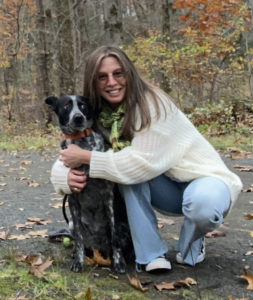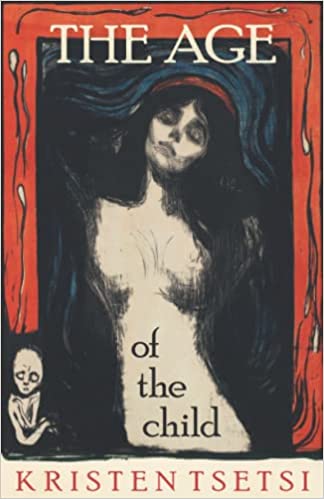Roe v. Wade wasn’t the reason for my post-Roe novel
 When I was working on THE AGE OF THE CHILD in 2015-16, I didn’t know I was—and had had no intention of—writing the “post-Roe v. Wade novel” it is.
When I was working on THE AGE OF THE CHILD in 2015-16, I didn’t know I was—and had had no intention of—writing the “post-Roe v. Wade novel” it is.
The drive behind the story wasn’t the law I’d naively assumed would never change, but society’s peculiar attitude toward parenthood. The best illustration I can think of is this: A woman I know told me some years ago that getting married and having kids was “just what you [and she] did.” Recently, after explaining to her that the goal of a podcast I co-host is to help inform women—all people, really—that they can choose to have, or not have, kids, she scoffed. Of course it’s a choice, she said. She had never heard, she said, of anyone feeling like they had to have kids. When I reminded her of what she’d told me about marriage and kids being “just what you do,” she said, “Well, sure. Why else would you get married?”
She didn’t hear her own programming. Most of us don’t. Unconsciously, our society essentially equates a person having a child with something as thoughtlessly instinctive as starlings, those interchangeable dots in the sky, banking in a murmuration. That it’s “just what you do” is so embedded in our way of thinking that many people honestly—truly—don’t realize having children is a decision they can make like any other. They simply have them, and without thoughtfully, consciously wanting to.
The interesting thing is that many people don’t think that’s a big deal. Having kids is natural, the thinking goes.
So, how much of a problem or hardship could a little unwanted baby possibly be?
And who’s it going to hurt, really, if we limit access to birth control or abortion services?
“You’ll learn to love it,” they’ll say, even to a stranger. “Try it.”
Try having a baby. Like it carries the consequent weight of tasting a hot pepper.
Like you can spit it out.
These are children.
Anyway. After years of thinking about this (and as someone who felt pressure from an ex to have a child, I thought about it a lot), that curious outlook became something I wanted to create a story and characters around. Not only did I think it was important, but from a writing perspective, the topic was alluring and sexy thanks to its high potential for awkwardly tense (my absolute favorite) moments.
The initial plan was to focus on two friends living in a time when reproductive rights had been re-envisioned in the interest of child welfare and having a child was a complicated process. One of the friends would want a child, but the rules would make it difficult for someone like her. Her determination to get pregnant—and the questionable demands she’d make of her friend to help achieve her goal—would challenge not only their friendship, but their safety.
I was so energized by the whole thing that I told my husband about it. When I finished, he said, “But why?”
“What do you mean?”
“Why did the change happen in the first place?”
It was an excellent question. (Not only because it absolutely needed addressing, but also because the only logical answer was one that ended up deepening the story while adding vibrant complexity to the characters and their conflict(s).) To answer it, I’d have to go back a generation, back to the thing that had taken the country down such an unexpected road that the government would have to implement new reproductive rights legislation. What could that thing have been but unanticipated drawbacks to previously changed legislation?
Before getting to the woman who had to fight to have a child, there would need to be a woman fighting to not have a child—after an overturn of Roe v. Wade.
The parallelism is probably more interesting if you’re writing an essay about it. What was more intriguing for me as a writer (and what I’d like as a reader) was following a character moment-by-moment through the first stages of something as societally chaotic as an overturn. The “after” can be interesting enough—a quick recap or flashback can usually explain what happened—but that’s not where the hard part lives. In real life, we fear the upheaval and wonder how we’ll navigate it. It’s scary. And, good or bad, it’s interesting.
Katherine, Part I’s protagonist, lives in the first interesting hard part, experiencing the overturn on a personal level when she arrives at the clinic to terminate her unwanted pregnancy and meets only dark windows and a heavy chain looped through the front doors’ handles.
The young woman from the later generation who’s determined to conceive, Katherine’s unwanted daughter Millie, battles the second hard part.
THE AGE OF THE CHILD, while a post-Roe novel in every way, was meant to be—and is—a story that questions our cavalier and rather heartless attitude toward babies and the people who make them. Had my intention been to write something about the amendment, there would have been too many angles to approach from, too many points to try to make, too much of a compulsion to be (more) political… It would have been Roe, Roe, Roe, and not Katherine, not Millie. Big government actions tempt a big look at the big picture, but if you pull too far back, all you see are dots.
—
THE AGE OF THE CHILD
 “Tsetsi’s spare, skillful prose lets the characters struggle in front of us so that we become like people behind a two-way mirror. When we are through, we are thinking hard about things we’ve heard many say and things we’ve thought or said ourselves about children or parenting. We’re tempted into a conversation that we’ve not had with spouses, friends, or acquaintances.” Elizabeth Marro, author of Casualties
“Tsetsi’s spare, skillful prose lets the characters struggle in front of us so that we become like people behind a two-way mirror. When we are through, we are thinking hard about things we’ve heard many say and things we’ve thought or said ourselves about children or parenting. We’re tempted into a conversation that we’ve not had with spouses, friends, or acquaintances.” Elizabeth Marro, author of Casualties
“The narrative is so engaging because it is so unsettling. Kristen Tsetsi tells a story that is no longer that improbable and that will keep you reading and wondering late into the night. I’ve never read anything like this.” James C. Moore, MSNBC commentator and New York Times best-selling author of Bush’s Brain: How Karl Rove Made George W. Bush Presidential
Katherine is accidentally pregnant in a newly post-Roe v. Wade America and the last hold-out clinic, where she’d made an appointment for an abortion, has locked its doors.
A new law also demands that all miscarriages be investigated for “authenticity.” (And herbs and vitamins that might, if used the right way, end a pregnancy are rationed.)
The story follows Katherine, and then her legally-enforced daughter Millie and Millie’s friend Lenny, at different points in a near-future in which the laws aren’t kind to any of their desires. Years after the overturn, the government assesses the aftermath, and by the time Katherine’s daughter and Lenny are young adults, they’re living in a time when the laws have changed again: people are encouraged to be parents, but only under approved conditions.
THE AGE OF THE CHILD’s focus on the women’s personal stories allows for an intimate exploration of the effects of opposite government policies and the surprising pitfalls of the two extremes.
BUY HERE
Kristen Tsetsi
Her first novel, the independently released Pretty Much True (originally Homefront), was included in Saint Joseph’s University professor Dr. Owen W. Gilman, Jr.’s “American War Literature and Film: Vietnam to Now” 2012 course curriculum and
Kristen’s second novel, The Year of Dan Palace (published under the pen name Chris Jane), has been called “stunningly good” by Indie Bookworm and “impossible to put down” by Pop Culture Zoo. One Amazon reviewer expressed impressive hatred of it.
Her short fiction has won the Storyglossia Fiction Prize and has been nominated for a Pushcart Prize. Her short story collection Carol’s Aquarium, which includes prize- and award-winning stories as well as some that were previously unpublished, is available here.
Kristen contributes regularly to the writers’ and publishers’ resource website JaneFriedman.com, primarily with a series of interviews with writers and others in the publishing industry. She’s also the creator of Obitogy.com and a 1/3 founding non-mother of the Childfree Girls web series and podcast.
She’s happy to be available for in-person or Skype/Facetime book club or classroom discussions. More information (features, interviews, appearances) here.
Category: How To and Tips
























